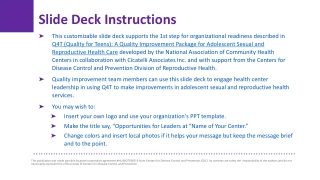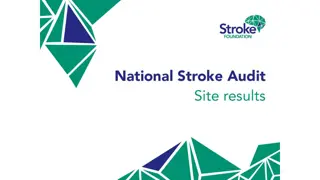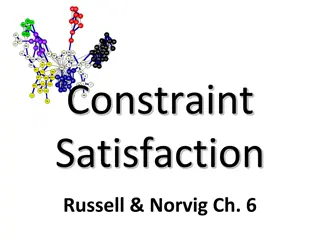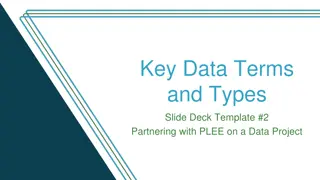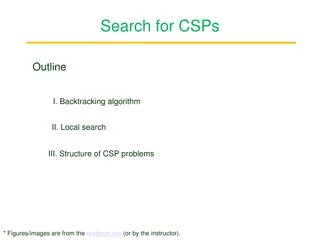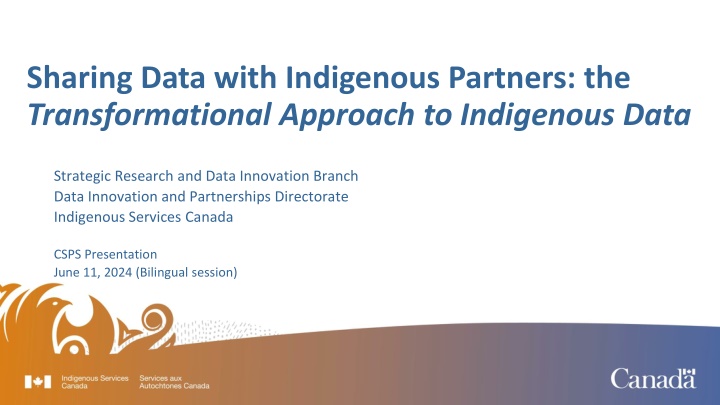
Transformational Approach to Indigenous Data Sharing Initiative
Explore the Transformational Approach to Indigenous Data Sharing by Indigenous Services Canada, focusing on facilitating data sharing with Indigenous partners for self-determination. Learn about the initiative's phases, drivers, and impact on Indigenous data sovereignty and service delivery responsibilities. Discover how ISC is advancing Indigenous Data Sovereignty as a government-wide priority in alignment with Canada's commitments.
Download Presentation

Please find below an Image/Link to download the presentation.
The content on the website is provided AS IS for your information and personal use only. It may not be sold, licensed, or shared on other websites without obtaining consent from the author. If you encounter any issues during the download, it is possible that the publisher has removed the file from their server.
You are allowed to download the files provided on this website for personal or commercial use, subject to the condition that they are used lawfully. All files are the property of their respective owners.
The content on the website is provided AS IS for your information and personal use only. It may not be sold, licensed, or shared on other websites without obtaining consent from the author.
E N D
Presentation Transcript
Sharing Data with Indigenous Partners: the Transformational Approach to Indigenous Data Strategic Research and Data Innovation Branch Data Innovation and Partnerships Directorate Indigenous Services Canada CSPS Presentation June 11, 2024 (Bilingual session) 1
Purpose & Context Today s presentation will: Outline the data sharing work ISC is leading under the Transformational Approach to Indigenous Data initiative. Focus on the initial phase of this initiative concerning how ISC will facilitate data sharing with Indigenous partners as a first step towards the eventual transfer of service delivery responsibilities to Indigenous control along with related departmental data assets. Present the key pillars of ISC s approach to data sharing with Indigenous partners and other organizations external to government: introducing the tools, governance structure, and government- wide networks ISC is developing in support of this goal. Contextualize data sharing under the initiative in the context of Canada's broader commitments to Indigenous Data Sovereignty as a government-wide priority in both the Federal Data Strategy and the UN Declaration Act Action Plan. 2
ISCs Approach to Data Sharing: Main Drivers To respond to an increasing demand for ISC data holdings, and provide great clarity on ISC s approach to data sharing to facilitate data sharing as a first step towards the eventual transfer of service delivery responsibilities to Indigenous control along with related departmental data assets. ISC is developing a standardized approach to external data sharing. to fulfill the commitment ISC made under the National Action Plan on Open Government to advance the Government of Canada s support for Indigenous Data Sovereignty as outlined in the 2023-2026 Data Strategy for the Federal Public Service and the UN Declaration Act Action Plan 3
Background: Transformational Approach to Indigenous Data Initiative The Transformational Approach to Indigenous Data initiative (supported by Budget 2021 and launched in 2022) will bridge data gaps and encourage Indigenous self-determination and data sovereignty by supporting the development of First Nations-, Inuit-, and M tis-led statistical capacity in the form of distinctions-based institutions, organizations, or functions. The initiative as a whole is expected to take a minimum of three phases and six years of development, and will culminate in First Nations-, Inuit-, and M tis-led statistical capacity in the form of distinctions- based institutions, organizations, or functions. Stream 1 focuses on improving ISC s external data sharing with Indigenous partners. Streams 2 through 5 focus on supporting First Nations, Inuit, and M tis organizations in building the data capacity they need and increasing their visibility in Canada s national statistics First Nations, Inuit and M tis require strengthened data capacity in order to advance self-determination and effectively respond to the distinct and evolving service delivery needs of their citizens. 4
Context: The State of Data Sharing at ISC The Department regularly responds to requests for data sharing from external parties, including Indigenous organizations, governments, communities, and their partners. The data and information that ISC is requested to share include records related to residential schools, department-collected data (e.g., Indian Register), Indigenous knowledge, intellectual property, community- level data, and personal data. Data also encompasses more than just spreadsheet entries; it includes a broad spectrum of information formats, from electronic files and physical documents to non-sensitive government records. Historically, this sharing has been done on an ad-hoc, siloed basis. The lack of a consistent and standardized approach to data sharing presents risks to the Department. Data sharing initiatives will likely only increase in the evolving Indigenous data governance landscape and with the Department s mandate to transfer services and programs to Indigenous entities. In view of this context, and in line with our Transformational Approach to Indigenous Data, steps were taken to formalize a departmental approach to improve our outward data sharing process. 5
Data sharing under the Initiatives first stream ISC s Chief Data Officer and Chief Information Officer lead the Department s efforts to advance and improve the sharing of ISC data holdings with Indigenous partners by strengthening internal capacities and enhancing our data sharing infrastructures. This work includes: Directly supporting data sharing requests. Standardizing the data sharing process across the Departmentthrough an internal Guide to External Data Sharing was developed and launched for general use in January 2024. Preparing to engage and develop a Policy on External Data Sharing for departmental use. 6
Data Sharing Requests & Information Sharing Agreements The Department regularly responds to data sharing requests from Indigenous partners. Some requests involve the creation of Information Sharing Agreements (ISA) a generic term for any instrument that is signed by both ISC and the party(ies) receiving the data, which contain agreed upon terms and conditions regarding the collection, use, management, and/or subsequent disclosure of the data. These Agreements are generally used to fulfill data requests that come into the Department outside the existing channels, and which require custom-built datasets, and/or non-redacted datasets containing restricted information. Whatever their form, Information Sharing Agreements with external parties [i.e., parties external to federal government] must always be specified and understood as legally binding. The CDO and CIO have set up bodies to manage and oversee the development of Information Sharing Agreements; and together, they meet regularly to address issues and delays that arise in these often quite complex data sharing requests. 7
Guide to External Data Sharing: Standardizing the data sharing process across the Department ISC developed a Guide to External Data Sharing, which sets the departmental standard by presenting the data sharing process over 6 stages. The Guide is one of our biggest accomplishments under the first stream of the Transformational Approach to Indigenous Data. It provides ISC program areas with a step-by-step/how-to guidance and tools on fulfilling external requests for data. The Guide empowers sector officials, called Executive Data Stewards, to responsibly and efficiently process external requests for data, from the initiation of a request to the secure transmission of data. It includes toolsto help Executive Data Stewards execute their role and improve the data sharing process, including the creation of Information Sharing Agreements if necessary. Department-wide training sessions on the Guide have been carried out. 8
Guide to External Data Sharing: The Executive Data Steward The Guide showcases the role of the Executive Data Steward, which is a Sector official (typically at the Director General-level) responsible for managing and making executive decisions about how data under their authority are handled and used. Through the Guide, Executive Data Stewards are empowered to manage the data request process on behalf of their Program Area, consulting with Legal, Privacy and other subject matter experts as required. The Guide walks these stewards through making determinations on how to share data in a manner that aligns with our legislative responsibilities and with consideration to the interests of our Indigenous partners. Executive Data Stewards determine if an ISA needs to be engaged and how to undertake its creation. As the name suggests, we do not own the data, rather the data are under the care and control of the Department, and we are the stewards. 9
Guide to External Data Sharing: The Screening Tool for Data Requests When an external data request is received, Executive Data Stewards must conduct an initial screening of the request. Key sections of the Screening Tool include: Administrative questions i.e., who is requesting the data? Section 1: Determine what data are needed i.e., what are the data needs of the requestor? Section 2: Determine if the requested data are restricted i.e., are the requested data considered restricted based on ISC s data restriction typology? Section 3: Determine whether there is a legal obligation to provide the data i.e., is ISC legally obligated to fulfill the request? Section 4: Determine the benefit to Indigenous peoples of providing the requested data i.e., is the disclosure to the benefit of Indigenous peoples and does it support ISC s mandate and drive to advance Indigenous self-determination and data sovereignty? Section 5: Determine the resources required to fulfill the request i.e., is it feasible to complete the request, and reasonable given the time and resources to complete it? Based on the results of this screening, Executive Data Stewards will decide to fulfill (fully or partially) or deny the request and how to proceed with the next steps in the data sharing process. 10
Guide to External Data Sharing: ISC Data Restriction Typology ISC has developed the following typology to illustrate the three main types of data that should be considered restricted. Type A is data containing Personal Information as defined by the Privacy Act. GoC security classification of Protected A, B, or C. Type B is data that are subject to other legal or national interest restrictions. GoC security classification of Confidential, Secret, or Top Secret. Type C is data about individual First Nations, Inuit, or M tis communities which ISC recognizes as sensitive and may limit its disclosure. GoC security classification of Protected A, B, or C. 11
Guide to External Data Sharing: Information Sharing Agreement Template 12
Work in Progress: Policy on External Data Sharing ISC is developing a Policy on External Data Sharingaiming to streamline and improve data sharing outwardly with Indigenous Peoples, governments, organizations and their partners, as well as other external stakeholders. The Policy will explore broader questions about data sharing, such as understanding the types of data and information that external partners want and for what purposes, which will help us improve our handling of data and information requests. The Policy will clarify the Department s key data sharing processes, roles and responsibilities for appropriately sharing data externally, including identifying the types of data that should be shared. It is an evergreen vehicle for implementing Indigenous-driven data sharing priorities and objectives as they emerge and evolve. The Guide and Policy are complementary in purpose as the Guide addresses the how of external data sharing, while the Policy address the what and why of external data sharing. 13
Developing the Policy: Engagement In the development of this Policy on External Data Sharing, ISC is committed to engage with Indigenous governments and organizations, and other external stakeholders. In doing so, we will have the Policy be guided by First Nations, Inuit, and M tis-driven principles and objectives, so that we meet the expectations of Indigenous governments and organizations, and other external parties, when it comes to the sharing of data. We are planning to launch a multi-stage engagement process with First Nations, Inuit, and M tis governments and organizations by this summer, 2024. 14
Supporting external data sharing: Data governance at ISC External data sharing relies on mature departmental data stewardship and data governance processes. This diagram show the many committees that form part of this integral governance structure. There is a committee working to implement strong data governance structures at ISC that will help ensure proper oversight over data practices. This broader governance structure is critical for the success of ISC s work under the Transformational Approach to Indigenous Data. We leverage this broader governance structure to communicate and seek feedback on key decision points and deliverables. 15
Collaborating for Success: Advancing Indigenous Data Sovereignty Improving external data sharing in our Department occurs in the context of ISC s support of broader GOC efforts and commitments to support Indigenous Data Sovereignty. Some work ISC has been doing in this space includes: Co-leading a DG-level, interdepartmental working group to advance support for Indigenous Data Sovereignty;. Co-chairing the Interdepartmental Collaborative Committee on Indigenous Data (ICCID. Refreshing our Departmental Data Strategy to include Indigenous Data Sovereignty as an expected outcome. Presenting ISC s efforts to advance the Transformational Approach to Indigenous Data and Indigenous Data Sovereignty at interdepartmental venues. Supporting various missions under the Federal Data Strategy to advance a whole-of- government approach to managing and sharing Indigenous data, and data standards on interoperability. 16
Re-Cap on ISCs approach to data sharing ISC sTransformational Approach to Indigenous Data initiative is crucial to the Department s strategy to bridge data gaps and support Indigenous self-determination and data. ISC's outward data sharing work under the first stream of its initiative includes: o Standardizing the data sharing process across the Department through our Guide to External Data Sharing. o The Guide includes tools that empower and support the Executive Data Stewards to share data responsibly, including a Screening Tool and an Information Sharing Agreement Template. Under the first stream of this initiative, ISC is preparing to engage and develop a Policy on External Data Sharing for departmental use. 17
Connect with Us Questions? Want to know more about external data sharing and the Transformational Approach to Indigenous Data? Contact us at: gouvernancedesdonnees-datagovernance@sac-isc.gc.ca 18

